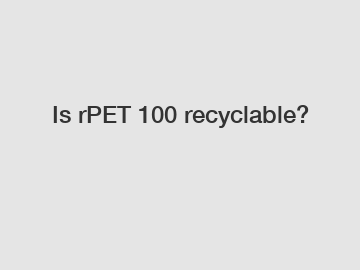Is rPET 100 recyclable?
In recent years, the global focus on sustainable and eco-friendly practices has skyrocketed. As a result, innovative solutions like rPET (recycled polyethylene terephthalate) have gained significant attention due to their potential to reduce waste and alleviate environmental concerns. However, questions often arise concerning its recyclability. In this blog post, we will dive deep into the subject, examining the various aspects of rPET's recyclability, and determining whether it truly lives up to its eco-friendly reputation.
Understanding rPET:
Before we delve into its recyclability, let's briefly explore what rPET is. rPET refers to the process of converting post-consumer, or even post-industrial, PET plastic waste into new products. This recycling technique aims to reduce the demand for virgin PET (commonly used for bottles, jars, and other packaging materials), effectively decreasing the negative environmental impacts associated with its production.

The Recycling Process:
The first step in understanding rPET's recyclability is gaining insight into its manufacturing process. Recycling PET waste involves collecting plastic containers, sorting them based on resin type, and washing and grinding them into flakes. These flakes are then melted and processed into a form suitable for further manufacturing, while impurities such as labels and caps are removed.
The Recyclability of rPET:
Here comes the crucial question: Is rPET genuinely 100% recyclable? The simple answer is yes. rPET can be recycled again and again, undergoing the same process repeatedly without significant degradation in quality. This highlights the remarkable attribute of rPET, as it provides a sustainable solution for tackling the persistent environmental challenge posed by plastic waste.
Benefits of rPET Recycling:
1. Waste Reduction: By diverting PET containers from landfills, rPET recycling reduces waste accumulation. In turn, this minimizes environmental pollution and carbon emissions associated with traditional manufacturing processes.
2. Energy Conservation: The production of rPET requires significantly less energy compared to manufacturing virgin PET. This conservation of energy directly translates into reduced reliance on fossil fuels and contributes to a more sustainable future.
3. Raw Material Conservation: With the use of rPET, the demand for virgin PET decreases. Consequently, fewer natural resources are exploited, conserving oil reserves and preserving the ecological balance.
4. Cost-Effective Solution: The recycling process for rPET is often more cost-effective than creating PET from scratch. This economic advantage encourages businesses to adopt sustainable practices, further driving the demand for recycled products.
Challenges and Limitations:
While rPET exhibits many advantages in terms of recyclability, a few challenges and limitations must be acknowledged. Firstly, the quality of rPET may vary depending on the post-consumer waste collection and sorting processes. Contamination and impurities can impact the final product's quality and market value. Moreover, not all PET containers are recyclable, and improper disposal methods can hinder the efficiency of rPET recycling. Raising awareness and improving recycling infrastructure can help overcome these challenges.
Conclusion:
It is evident that rPET is indeed 100% recyclable, offering a promising solution to the ever-growing plastic waste problem. Its recyclability, coupled with numerous environmental benefits, propels rPET as a viable alternative to traditional plastic manufacturing. To accelerate the adoption and success of rPET, collaborative efforts between consumers, businesses, and governmental bodies are vital. By choosing recycled products and championing recycling initiatives, we can collectively contribute to a cleaner, greener, and more sustainable future. Let's embrace the potential that rPET holds and revolutionize our approach to plastic consumption.
Want more information on rPET pellets, rPET pellets, rPET pellets? Feel free to contact us.
263
0
0

Comments
All Comments (0)